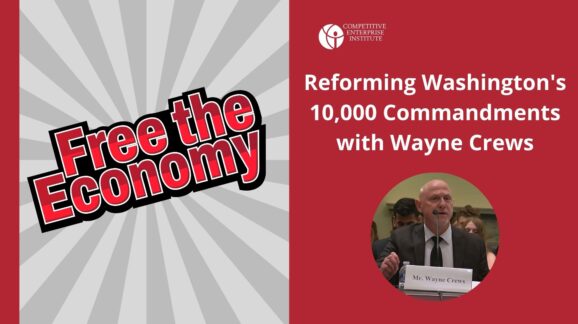There are two main areas in which Congress can enact meaningful reform. The first is to rein in regulatory guidance documents, which we refer to as “regulatory dark matter,” whereby agencies regulate through Federal Register notices, guidance documents, and other means outside standard rulemaking procedure. The second is to enact a series of reforms to increase agency transparency and accountability of all regulation and guidance. These include annual regulatory report cards for rulemaking agencies and regulatory cost estimates from the Office of Management and Budget for more than just a small subset of rules.
In 2019, President Trump signed two executive orders aimed at stopping the practice of agencies using guidance documents to effectively implement policy without going through the legally required notice and comment process.
Featured Posts

Blog
Ten Thousand Commandments 2025 is out now
The 2025 edition of CEI’s flagship report, Ten Thousand Commandments, is out today. For more than 30 years, my colleague Wayne Crews has been…

Blog
Free the Economy podcast: Reforming Washington’s 10,000 Commandments with Wayne Crews
In this week’s episode we cover the political roots of totalitarianism, why we should put Fannie Mae and Freddie Mac out to…

Study
Ten Thousand Commandments 2025
Introduction Record federal debt is contributing to record-setting regulatory burdens. While new spending programs show up in budget figures, new regulations requiring the private sector…
Search Posts
Blog
Biden’s regulatory report is in, but key costs remain in the shadows
The election is over and among much else, federal regulations are emerging front and center for the incoming administration. While the federal debt sits…
Blog
Biden’s 2024 Federal Register page count already second highest ever
We’ve not closed the Book of Regulation for 2024, Biden’s final calendar year in office, but we can mark a milestone nonetheless. The Federal Register…
Blog
This week in ridiculous regulations: Cable pricing and outer space arms trafficking
Donald Trump won a second term. The change in power might mean a second regulatory midnight rush between now and the inauguration. An initial rush…
Blog
A 2024 CEI HALLOWEEN SPECIAL: A new inventory unmasking federal agency guidance documents
In my new Halloween-themed article at Forbes, I explore the eerie expanse of federal agency guidance documents. We have to try to have a…
Blog
The origins and lessons of the ‘Satanic Panic’ of the 1980s
Moral panics are just one of those things that free societies seem to go through on a regular basis. The “satanic panic” was the big…
Blog
The compliance crisis: Unveiling the regulatory loopholes agencies love
While federal regulatory reform is critical, it’s equally important that existing oversight laws be followed. Unfortunately, many of these laws are routinely disregarded, with little…
Staff & Scholars

Clyde Wayne Crews
Fred L. Smith Fellow in Regulatory Studies
- Business and Government
- Consumer Freedom
- Deregulation

Ryan Young
Senior Economist
- Antitrust
- Business and Government
- Regulatory Reform

Fred L. Smith, Jr.
Founder; Chairman Emeritus
- Automobiles and Roads
- Aviation
- Business and Government

Sam Kazman
Counsel Emeritus
- Antitrust
- Automobiles and Roads
- Banking and Finance

Marlo Lewis, Jr.
Senior Fellow
- Climate
- Energy
- Energy and Environment